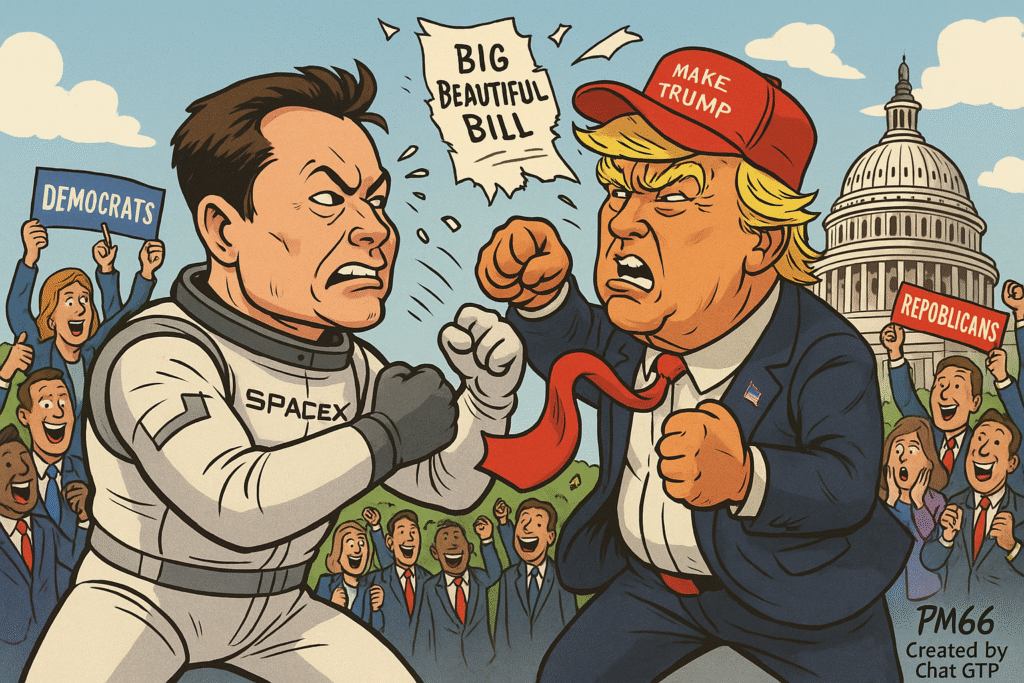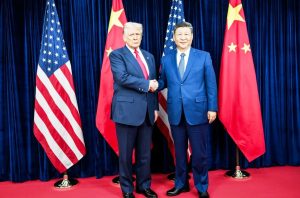Mercurial tech billionaire, Elon Musk and President Donald Trump fall-out. Cartoon/Created by Chat GTP
By PATRICK MAYOYO
In the volatile theatre of American power, few alliances were more surprising—or more precarious—than that between Elon Musk, the mercurial tech billionaire, and Donald J. Trump, the equally unpredictable 47th President of the United States.
Their partnership, once painted as a convergence of innovation and populism, now appears to be spiralling into what could become one of the most explosive political scandals in modern American history.
The recent public bust-up, triggered by President Trump’s contentious “Big Beautiful Bill”—a sweeping tax-and-spend package; has laid bare the deep ideological and economic fault lines between the two men.
But it’s not merely a falling out; it is a schism so dramatic and so public, that historians are already likening it to the nation’s most damaging presidential scandals: Watergate, Iran-Contra, and the Clinton–Lewinsky affair.
With allegations of dishonesty, veiled threats, and national security implications now interwoven with political retribution and financial chaos, the Musk–Trump split may yet define the legacy of a presidency already steeped in controversy; and drag America’s most powerful billionaire down with it.
America has a long and fraught relationship with political scandal. The Watergate scandal (1972–74) forced the resignation of President Richard Nixon after it emerged his administration had orchestrated a break-in at Democratic National Committee headquarters and subsequently attempted a cover-up.
In 1986, the Iran-Contra affair implicated senior Reagan administration officials in the illegal sale of arms to Iran to fund Nicaraguan rebels, severely tarnishing his second term. President Bill Clinton’s affair with White House intern Monica Lewinsky led to his 1998 impeachment for perjury and obstruction of justice, even if he survived removal from office.
These scandals did not just damage presidencies; they redefined the limits of executive power, tested institutional resilience, and reshaped public trust. The Trump–Musk fallout may do all three.
Musk’s initial support for Trump was a calculated pivot, not ideological alignment. By late 2023, the Tesla and SpaceX founder had become increasingly vocal about what he called “woke overreach” and “bureaucratic strangulation of innovation” under the Biden administration.
Trump’s promises of deregulation, nationalism, and economic sovereignty dovetailed with Musk’s libertarian leanings and his need for a friendly regulatory environment.
At stake were billions in government contracts and tax credits. Tesla had long benefited from federal subsidies tied to electric vehicle (EV) production and consumer tax rebates. More critically, SpaceX was a key contractor for NASA and the Pentagon, putting Musk’s businesses at the centre of American space and defence strategy.
Backing Trump, Musk believed, was a pragmatic way to protect these advantages. In return, he anticipated influence; on AI regulation, on EV policy, and on trade rules affecting Tesla’s global supply chains.

Elon Musk poses with the statue of a former US President in the White House. PHOTO/White House.
His courtship of power extended to regular communications with Trump’s advisors and high-level attendance at campaign fundraisers, including one in Trump’s Mar-a-Lago residence that reportedly netted $12 million.
But Trump’s nationalist economic turn, especially his “America First” tariff regime and “Big Beautiful Bill”, eventually put Musk’s global ambitions in direct conflict with the White House.
The “Big Beautiful Bill” was the spark that ignited the fire. Marketed as a transformative infrastructure and manufacturing revival package, it was in reality a sprawling piece of legislation with layers of hidden provisions.
One such measure reportedly revised EV tax credits, favouring unionised automakers, effectively penalising Tesla, whose factories remain non-unionised. Another section introduced sweeping tariffs on Chinese lithium and rare earth imports, key components in Tesla’s battery supply chain.
Musk’s furious response was swift. “False,” he posted on X (formerly Twitter), denying Trump’s claim that he had been briefed on the bill. “This was passed in the dead of night. Almost no one even read it.”
That denial quickly escalated to accusations that Trump was deliberately sabotaging Tesla for political gain, and worse, hiding national security secrets related to the Jeffrey Epstein case.
In retaliation, Trump threatened to cancel federal contracts with Musk’s companies. “We’ve helped him more than anyone,” Trump told Fox News. “If he wants to act like a traitor, he can go find another government to fund his rockets.”
The next escalation came with Musk’s stunning (if short-lived) threat to decommission the Dragon spacecraft, a move that could have stranded American astronauts on the International Space Station. Though Musk quickly reversed course, the damage was done: the public now saw the feud as endangering national security.
Markets reacted with unambiguous alarm. Tesla stock plummeted 14.2 percent in one day, wiping out over $150 billion in market capitalisation and knocking $8.7 billion off Musk’s personal wealth.
Shareholders filed class action lawsuits within 48 hours, alleging Musk’s conduct had recklessly destabilised the company. SpaceX investors began to worry that Pentagon contracts could be suspended amid a congressional inquiry.
In Washington, Musk’s allegation that the Trump administration had “suppressed Epstein files” sparked outrage; and immediate denials from the White House. Press Secretary Alicia Denton dismissed the claims as “baseless, inflammatory, and deeply unfortunate”.
But the assertion lit a fuse among conspiracy theorists, prompting calls for a new special counsel to investigate both Musk’s claims and Trump’s undisclosed connections with Epstein.
Steve Bannon’s sudden re-emergence added fuel to the fire. By suggesting Musk’s citizenship be re-examined, Bannon sought to nationalise the feud, making Musk the enemy not just of Trump, but of America First populism. Right-wing media seized on the narrative, accusing Musk of betrayal, while Democrats saw an opportunity to fracture the Republican base.

The estranged friends at work during their happy days. PHOTO/White House.
The fallout has already done significant damage, but the long-term losers are still being sorted. Musk, once untouchable in Silicon Valley and admired in Washington, is now vulnerable from multiple fronts: regulatory scrutiny, shareholder rebellion, and political retribution.
Musk’s companies depend heavily on government goodwill. Should congressional investigations gain steam, or federal contracts be reviewed, the economic consequences for Tesla and SpaceX could be existential.
Trump, on the other hand, risks being seen as erratic and vindictive; qualities that alienate independent voters even as they delight his base. The Republican Party is deeply split.
Senate Republicans are reportedly “alarmed” by the chaos, with figures like Mitt Romney and Lisa Murkowski calling for calm. More significantly, JD Vance, long seen as a possible Trump successor, has remained silent on Musk’s endorsement, a silence some interpret as tacit agreement.
In this zero-sum clash of titans, the likely long-term loser is Musk. While Trump thrives on political confrontation and media spectacle, Musk’s empire is built on confidence; investor confidence, customer confidence, and regulatory goodwill. His dalliance with politics may have finally tipped from genius to hubris.
What elevates this feud from a mere personality clash to a historic scandal is its sheer breadth. It spans national security, market manipulation, space exploration, and corruption allegations.
It features a sitting president, a global tycoon, and hints of suppressed files related to one of the most notorious sex offenders in recent memory.
If Musk produces evidence backing his Epstein allegations, or if congressional Republicans turn on Trump under mounting economic pressure, this feud could reshape the political landscape heading into the 2026 midterms. Conversely, if Musk is cornered into a retreat, it may serve as a cautionary tale about the cost of proximity to political power.
Already, historians are drawing comparisons to Watergate: not in the nature of the crimes, but in the scale of institutional betrayal, the erosion of public trust, and the possibility that America’s democracy could again be tested by men who mistake personal power for national interest.
In the end, the Musk–Trump scandal is more than a personal rupture. It is a parable of modern America: of billionaires over-reaching, presidents weaponising office, and institutions struggling to keep pace with outsized egos.
Whether it ends in impeachment, corporate collapse, or slow mutual ruin, this is a moment that will be studied for decades. And just like Watergate, it may start with a denial—but it won’t end without consequences.
The writer is a Director of Editorial Innovations at EYEWITNESS MEDIA GROUP



















